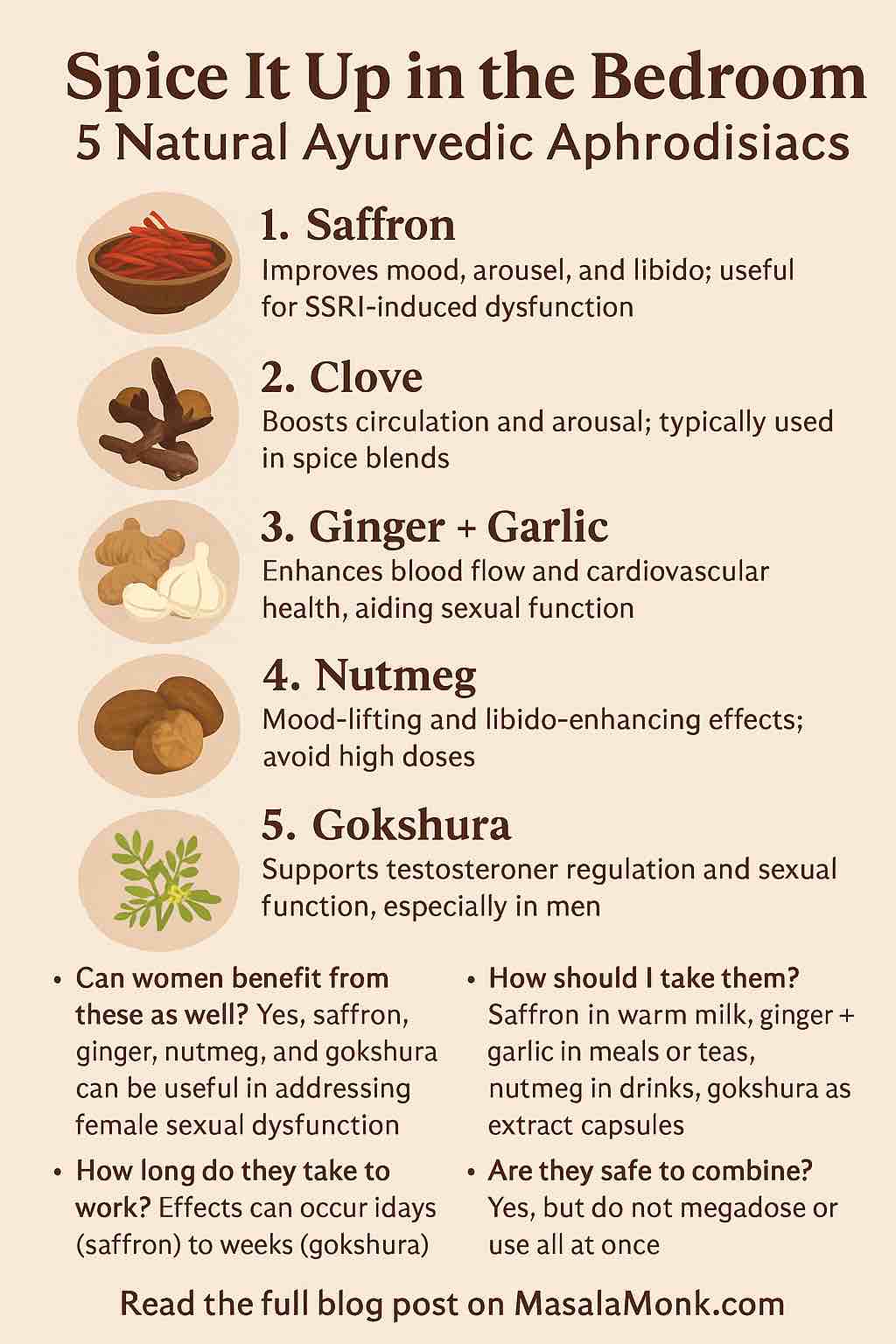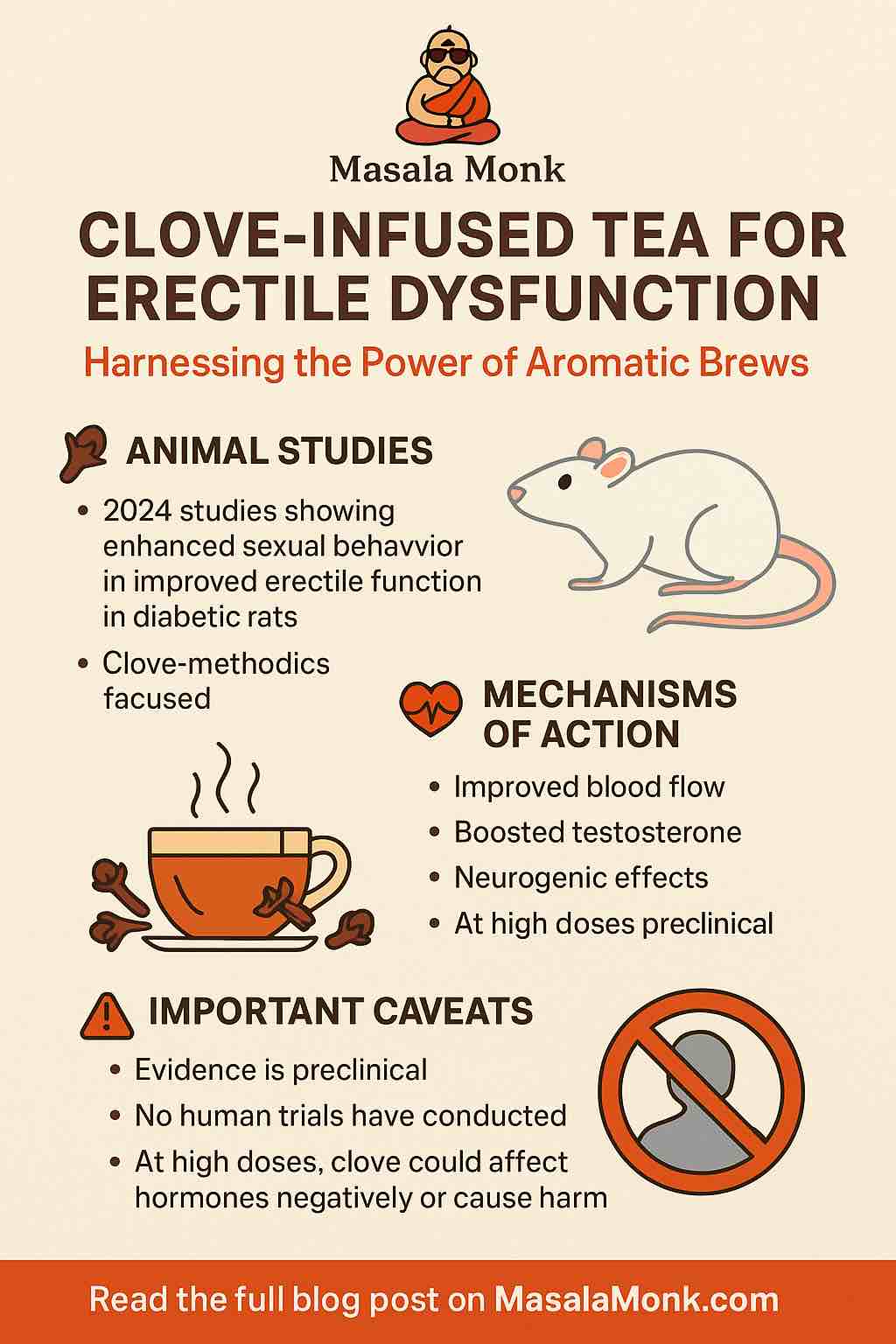
When it comes to intimacy and desire, nature has had your back long before pharmaceutical solutions entered the picture. For centuries, Ayurveda—India’s traditional system of medicine—has offered powerful natural remedies to enhance vitality, increase libido, and restore balance in body and mind.
And what’s exciting is that many of these remedies are hiding right in your kitchen.
In this post, we’re diving into 5 natural spices from Ayurveda that are believed to act as aphrodisiacs—and we’ll explore not just the tradition, but also the modern science behind each. You’ll also find ways to use them, safety tips, and how to build your own “bedroom spice ritual” naturally.
Let’s spice things up. Literally.
🔥 1. Saffron – The Sensual Spice
In Ayurveda: Saffron (Kumkuma) is considered a tridoshic spice, meaning it balances all three doshas—Vata, Pitta, and Kapha. It’s used to lift mood, improve fertility, and increase “ojas” — the essence of vital life energy.
What Science Says:
- A 2025 study found that saffron improved libido and arousal in both men and women, especially in those with antidepressant-related sexual dysfunction.
- Women taking 30 mg/day saw improvements in desire, lubrication, and satisfaction scores within 6 weeks.
- In men, saffron has been linked to improved erectile function and overall sexual satisfaction.
How to Use:
- Soak 3–5 saffron threads in warm milk or ghee overnight and drink before bed.
- Add to teas, rice, or bedtime lattes with nutmeg and cardamom.
Bonus: It smells and tastes divine—sensuality starts with the senses.
Also Read : Saffron as an Aphrodisiac: Unveiling the Sensual Secrets of the Red Gold
🌿 2. Clove – Circulation and Heat
In Ayurveda: Known as Lavanga, clove is used to warm the body, improve blood flow, and tone reproductive organs. It’s often added to aphrodisiac oils and formulas.
Science Snapshot:
- Clove contains eugenol, which increases blood circulation and may aid arousal.
- Animal studies suggest clove extracts improve mating behavior—but no human clinical trials yet.
How to Use:
- Brew 1–2 cloves with ginger and cardamom into a spice tea.
- Use clove-infused oil in sensual massage (diluted with a carrier oil like almond or sesame).
Also Read : Clove-Infused Tea for Erectile Dysfunction: Harnessing the Power of Aromatic Brews
🧄 3. Garlic + Ginger – The Power Couple
In Ayurveda: Garlic (Lahsun) and ginger (Adrak) are digestive, warming, and invigorating. They’re used to stoke “Agni”—the digestive fire—believed to fuel sexual vigor too.
What Research Says:
- Ginger supports nitric oxide production, crucial for erections and blood flow.
- Garlic may help with arterial elasticity and blood circulation, boosting cardiovascular health (key for sexual vitality).
How to Use:
- Try “Garlic Ginger Milk”: simmer 1 crushed garlic clove and a few ginger slices in milk with saffron before bedtime.
- Use garlic-ginger paste in your evening meals to warm the body before intimacy.
🌰 4. Nutmeg – The Mood-Lifting Spice
In Ayurveda: Called Jaiphal, nutmeg is used in very small doses to calm the mind, enhance desire, and promote restful sleep.
Science Says:
- Animal research shows nutmeg can increase sexual behavior, possibly due to its calming, mood-enhancing effects.
- It contains myristicin, a compound that may support dopamine balance and create mild euphoria when used correctly.
How to Use:
- Stir ¼ tsp of freshly grated nutmeg into warm milk or a spiced bedtime drink.
- Combine with cinnamon and cardamom for a romantic dessert or chai.
Caution: Too much nutmeg can cause nausea or hallucinations. Use no more than ½ tsp daily.
Also Read : Embracing Nutmeg for Restful Sleep: 5 Ideas to Use Nutmeg for sleep support
🌾 5. Gokshura (Tribulus Terrestris) – The Ayurvedic Stamina Booster
In Ayurveda: Gokshura is classified as a Vajikarana herb, which enhances male fertility, strength, and sexual potency. It’s often used in Ayurvedic formulations for erectile dysfunction and low libido.
Modern Research:
- A 2024 RCT found that Gokshura combined with ginseng and L-arginine improved erectile function significantly.
- May support testosterone regulation and sperm quality—especially in men with borderline hormone levels.
How to Use:
- Best taken as a capsule or standardized extract (400–750 mg/day).
- Often combined with Ashwagandha or Shilajit for stronger effect.
🛠️ How to Build Your Own Bedroom Spice Ritual
- Morning: Start with warm ginger tea to activate circulation.
- Evening meal: Add garlic, ginger, and clove to curries or soups.
- Before bed: Drink saffron milk with nutmeg and cardamom.
- Supplement: If using Gokshura, take it with breakfast for hormonal support.
- Mood setting: Use clove oil or saffron-infused oil in diffuser or massage oils.
⚠️ Safety First: Use With Awareness
| Spice | Daily Safe Amount | Notes |
|---|---|---|
| Saffron | 30 mg or 5–7 threads | Avoid in pregnancy in high doses |
| Clove | 1–2 cloves/day | Excess can cause GI irritation |
| Garlic/Ginger | 1 clove + 1-inch ginger root | Avoid raw garlic if on blood thinners |
| Nutmeg | Max ½ tsp/day | High doses can be toxic |
| Gokshura | 400–750 mg/day (extract) | Avoid if on hormone therapy; check quality source |
🧘 Final Thoughts: Tradition Meets Intimacy
Spices in Ayurveda are more than just flavor enhancers—they’re healing tools. When combined with intentional practices, mindful eating, and loving presence, they can transform the way you experience intimacy.
You don’t need to chase complicated formulas or synthetic boosters. Just look to your kitchen—and your roots.
🔍 FAQs: Spice It Up in the Bedroom – 5 Natural Ayurvedic Aphrodisiacs
1. Can spices really act as aphrodisiacs?
Yes, in Ayurveda, several spices are considered vajikarana—agents that support sexual vitality, mood, and stamina. Some also have modern clinical support (e.g., saffron, gokshura) for enhancing libido and improving sexual function.
2. How does saffron work as an aphrodisiac?
Saffron improves mood, circulation, and arousal. Studies show it helps with SSRI-induced sexual dysfunction in women and improves erectile function in men. It may work by balancing neurotransmitters and reducing stress.
3. Is it safe to take saffron every day?
Yes, moderate daily intake (up to 30 mg or 5–7 threads) is safe for most people. High doses (>1.5 g) may be toxic and should be avoided, especially during pregnancy.
4. What is the best way to consume these aphrodisiac spices?
- Saffron: Steeped in warm milk
- Clove/Ginger/Garlic: In meals or teas
- Nutmeg: As a pinch in bedtime drinks
- Gokshura: As a standardized extract capsule (400–750 mg)
5. Can women benefit from these spices too?
Absolutely. Saffron, nutmeg, and ginger are especially useful for women to enhance mood, desire, and hormone balance. Gokshura has also shown some benefit in managing female sexual dysfunction.
6. Are these spices safe to combine together?
Yes, in culinary or low-dose therapeutic forms. Many Ayurvedic formulas combine these in precise ratios. Just avoid megadosing or using all at once without guidance.
7. How long do these spices take to show results?
Some (like saffron and ginger) may show subtle effects in a few days. Others, like gokshura, may require consistent use for 2–4 weeks for noticeable results.
8. Can I use clove or nutmeg topically?
Yes, diluted clove or nutmeg oil can be used in sensual massage oils. Always blend with a carrier oil like sesame or almond and test for skin sensitivity.
9. Who should avoid using these spices as aphrodisiacs?
- Pregnant/breastfeeding individuals (especially saffron and nutmeg)
- Those on blood thinners (garlic)
- People with hormone-sensitive conditions (gokshura)
- Individuals prone to allergies or digestive issues from spices
10. Are there any side effects of taking these spices for libido?
When used in moderation, side effects are rare. Overuse can cause:
- Nutmeg: hallucinations, nausea
- Garlic: digestive upset, bleeding risk
- Clove: mucous membrane irritation
- Gokshura: hormonal imbalances if overdosed
Always follow dosage recommendations and consult a professional if unsure.










